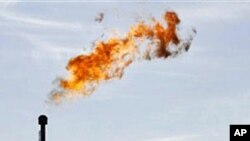After last summer's oil spill in the warm waters of the Gulf of Mexico, environmentalists are increasingly alarmed by Russia's massive oil and gas drilling plans for the Arctic.
While the Antarctic increasingly looks like a science and tourism park, the Arctic may increasingly look like an industrial park.
Russia already draws almost one quarter of its exports from the Arctic. Now, President Dmitry Medvedev has set a goal of making the Arctic Russia's 'top strategic resource base" by 2020.
To get there, Russia is embarking on $50 billion worth of Arctic energy projects - oil and gas drilling platforms, oil shipping terminals and liquefied natural gas plants. But after last summer's massive offshore oil spill in the warm waters of the Gulf of Mexico, environmentalists are asking Russia to take time to improve safety and pollution controls in its far north.
The executive director of the American environmental group Pacific Environment, David Gordon, talked at a recent Arctic conference in Moscow.
"We need to make sure we have the safety measures in place before we allow Arctic drilling to move forward," said Gordon.
In the event of an Arctic spill, he said, the dark winters, the extreme cold weather and the long distances from population centers would make cleanup operations much harder than the efforts last summer in the Gulf of Mexico.
"The numbers for the Gulf spill and the response to it are just staggering - 25,000 people responded to it, 3,800 vessels responded to it," Gordon said. "They used 10 million feet of boom. And none of that is available in the Arctic."
Prime Minister Vladimir Putin, a frequent visitor to Russia's polar regions, promised at the Arctic conference that "not a single industrial project in the Russian Arctic will be implemented without due consideration for the most stringent environmental requirements."
Noting the Arctic will soon become a major energy source and transportation corridor, he warned, "An irresponsible attitude towards the Arctic could spell global problems, rather than global advantages, in the near future."
A few days later, he signed five new Arctic oil and gas offshore drilling licenses.
At the conference, Vladimir Mulyak, a vice president of Russia's privately owned Lukoil oil company, said the BP spill was a clear warning for energy companies working in the Arctic.
Arctic drillers, he said, would pay more attention to pollution controls and to duplicating safety systems. This would make projects more expensive, but Mulyak predicted Lukoil's Arctic projects will remain profitable.
On December 2, Lukoil is expected to bid for rights to exploit two Russian Arctic fields that are believed to hold about two-billion barrels of oil. Last year, Lukoil built an Arctic terminal capable of pumping half a million barrels a day into oil tankers built with especially thick, ice resistant hulls.
Twenty one years ago, the massive Exxon Valdez oil spill in Alaska set an earlier generation of American environmentalists against energy production in the Arctic. The WWF vice president for Marine and Arctic policy, Bill Eichbaum spoke at the conference in Moscow.
"The Arctic environment would be very severely impacted as compared with the Gulf," he said. "A year and a half ago we commemorated the 20th anniversary of the Exxon Valdez spill, and I had rocks on my desk that had been dug up near the anniversary of the spill that were still covered with oil."
Most of the Arctic oil and gas reserves are believed to be in the relatively shallow waters of the continental shelf. But WWF's Eichbaum was not moved.
"Those conditions will be even more hazardous in the Arctic. Even if it is not deep water, it is hazardous water," said Eichbaum.
But the United States Geological Survey estimates that one quarter of the planet's undiscovered oil and gas reserves are in the Arctic. To many attendees at the conference, exploitation of these reserves was not a question of "if", but a question of "how" and of "when."












